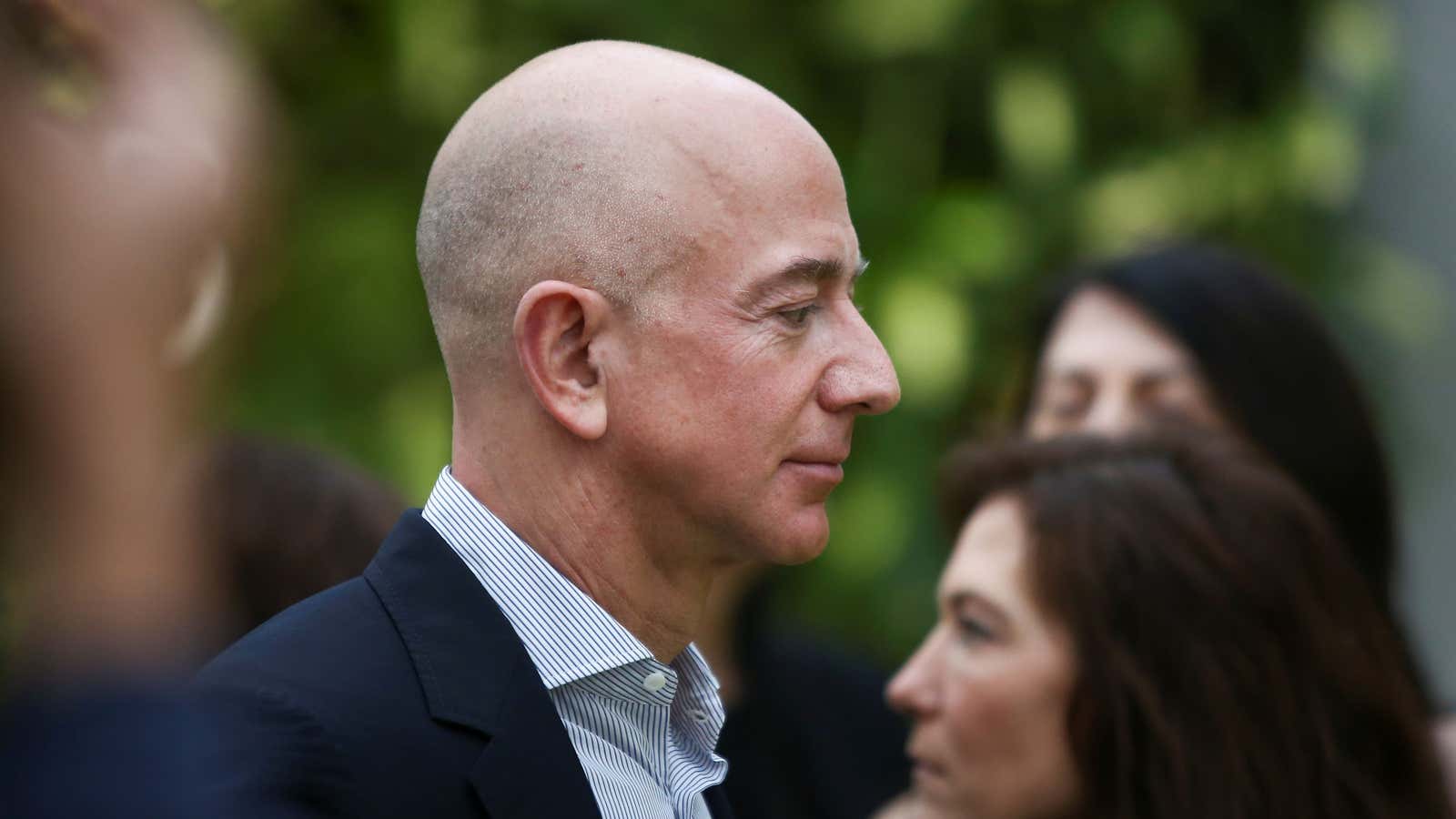This morning, Amazon made the surprising announcement that all of its US workers would now be paid at least $15 per hour, ostensibly succumbing to public pressure from the likes of Bernie Sanders, the Vermont senator and former US presidential candidate who has been calling on the retailer to raise its minimum wage.
“We listened to our critics, thought hard about what we wanted to do, and decided we want to lead,” CEO Jeff Bezos said in a press statement. On Twitter, Sanders praised the company, saying, “What Mr. Bezos has done today is not only enormously important for Amazon’s hundreds of thousands of employees, it could well be a shot heard around the world. I urge corporate leaders around the country to follow Mr. Bezos’ lead.”
Immediately, however, most other skeptics went to work, attempting to dig into Bezos’ motivation and suggesting alternative explanations for Amazon’s change of heart: perhaps the company needed to steal some fire from the pro-union movement building at Whole Foods, or respond to a tight labor market, or win some good publicity, for a change. Others fretted that automation will make it easier for Amazon to one day pay fewer workers the higher wage.
We can’t know with certainty what Bezo’s long-term angle is, or which combination of circumstances pushed him to this tipping point. Does he believe, as Henry Ford did, that his employees ought to be able to buy the products they handle every day? Or is he moved to appeal to a new consumer mindset—one that connects brands to social movements and political statements, exactly the type of conscious consumerism that Whole Foods caters to?
Here’s another related possibility: Bezos is protecting Amazon’s future by finally paying heed to the power of a strong workplace culture, the factor that some management experts say is ultimately the most potent force in a company’s success.
Culture is a leading indicator
Many companies are only now beginning to appreciate the brand-bending potential of a healthy workplace culture, though it’s hardly a recent revelation. Yesterday, at a breakfast talk in New York, Shane Green, a leadership and training consultant currently working with United Airlines to improve its corporate culture, said the managers he meets still tend to mentally link culture with retention or performance. In fact, he says, channeling Zappos CEO Tony Hsieh, “Brand is the lagging indicator of culture.” Culture drives it all. (As it happens, Bezos has said he bought Zappos in 2009 partly to understand the online shoe retailer’s peculiar and successful workplace ethos.)
Hsieh is far from the only CEO who has prioritized culture as a top-leadership level concern. Howard Schultz made the same call at Starbucks, where the former CEO and founder chose to offer full and part-time employees benefits and stock options, for instance. Last year, he forfeited a day of sales across all US locations to double down on anti-bias training when a revealing public incident made it necessary. It’s difficult to quantify, yet somehow easy to see, a connection between popular consumer brands and their treatment of their people. On the flip side, we can also identify a few that will be forever remembered for ugly incidents that epitomized a toxic internal culture. Uber and Wells Fargo, for example, are still in damage-control mode long after suffering workplace scandals.
Asked yesterday how Steve Jobs got away with being a supreme jerk at Apple, terrifying employees while the brand soared, Green replied that the larger culture just hadn’t caught onto the late Apple founder, but that it would have.
An obvious move
When management gurus espouse the virtues of improving workplace culture, they don’t linger long on the givens, like competitive wages and a safe environment. At a certain point, once basic needs have been met, money is actually not the strongest motivator, research has shown.
So where does that leave Amazon, where warehouse employees were arguably not only grossly underpaid, but have also complained of injuries and grueling conditions, and have told reporters that they sometimes urinate into bottles to avoiding missing deadlines? In that light, rather than good corporate citizenship, lifting wages to an acceptable level looks more like a no-brainer step toward ensuring the longevity of a nearly trillion-dollar brand. It’s also necessary if Amazon wants to compare itself to Walmart or the country’s tech companies, which are also now signaling corporate compassion for not only their direct employees, but in some cases even their contractor’s employees.
It would be wrong to minimize the impact today’s news will have on families and the communities they live in, but, if this is about Amazon’s culture and brand legacy, the more complicated repair work still lies ahead.
